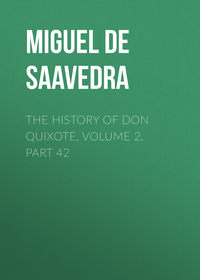Kitabı oku: «The History of Don Quixote, Volume 2, Part 42», sayfa 3
"And," added the housekeeper, "will your worship be able to bear, out in the fields, the heats of summer, and the chills of winter, and the howling of the wolves? Not you; for that's a life and a business for hardy men, bred and seasoned to such work almost from the time they were in swaddling-clothes. Why, to make choice of evils, it's better to be a knight-errant than a shepherd! Look here, senor; take my advice-and I'm not giving it to you full of bread and wine, but fasting, and with fifty years upon my head-stay at home, look after your affairs, go often to confession, be good to the poor, and upon my soul be it if any evil comes to you."
"Hold your peace, my daughters," said Don Quixote; "I know very well what my duty is; help me to bed, for I don't feel very well; and rest assured that, knight-errant now or wandering shepherd to be, I shall never fail to have a care for your interests, as you will see in the end." And the good wenches (for that they undoubtedly were), the housekeeper and niece, helped him to bed, where they gave him something to eat and made him as comfortable as possible.
CHAPTER LXXIV.
OF HOW DON QUIXOTE FELL SICK, AND OF THE WILL HE MADE, AND HOW HE DIED
As nothing that is man's can last for ever, but all tends ever downwards from its beginning to its end, and above all man's life, and as Don Quixote's enjoyed no special dispensation from heaven to stay its course, its end and close came when he least looked for it. For-whether it was of the dejection the thought of his defeat produced, or of heaven's will that so ordered it-a fever settled upon him and kept him in his bed for six days, during which he was often visited by his friends the curate, the bachelor, and the barber, while his good squire Sancho Panza never quitted his bedside. They, persuaded that it was grief at finding himself vanquished, and the object of his heart, the liberation and disenchantment of Dulcinea, unattained, that kept him in this state, strove by all the means in their power to cheer him up; the bachelor bidding him take heart and get up to begin his pastoral life, for which he himself, he said, had already composed an eclogue that would take the shine out of all Sannazaro had ever written, and had bought with his own money two famous dogs to guard the flock, one called Barcino and the other Butron, which a herdsman of Quintanar had sold him.
But for all this Don Quixote could not shake off his sadness. His friends called in the doctor, who felt his pulse and was not very well satisfied with it, and said that in any case it would be well for him to attend to the health of his soul, as that of his body was in a bad way. Don Quixote heard this calmly; but not so his housekeeper, his niece, and his squire, who fell weeping bitterly, as if they had him lying dead before them. The doctor's opinion was that melancholy and depression were bringing him to his end. Don Quixote begged them to leave him to himself, as he had a wish to sleep a little. They obeyed, and he slept at one stretch, as the saying is, more than six hours, so that the housekeeper and niece thought he was going to sleep for ever. But at the end of that time he woke up, and in a loud voice exclaimed, "Blessed be Almighty God, who has shown me such goodness. In truth his mercies are boundless, and the sins of men can neither limit them nor keep them back!"
The niece listened with attention to her uncle's words, and they struck her as more coherent than what usually fell from him, at least during his illness, so she asked, "What are you saying, senor? Has anything strange occurred? What mercies or what sins of men are you talking of?"
"The mercies, niece," said Don Quixote, "are those that God has this moment shown me, and with him, as I said, my sins are no impediment to them. My reason is now free and clear, rid of the dark shadows of ignorance that my unhappy constant study of those detestable books of chivalry cast over it. Now I see through their absurdities and deceptions, and it only grieves me that this destruction of my illusions has come so late that it leaves me no time to make some amends by reading other books that might be a light to my soul. Niece, I feel myself at the point of death, and I would fain meet it in such a way as to show that my life has not been so ill that I should leave behind me the name of a madman; for though I have been one, I would not that the fact should be made plainer at my death. Call in to me, my dear, my good friends the curate, the bachelor Samson Carrasco, and Master Nicholas the barber, for I wish to confess and make my will." But his niece was saved the trouble by the entrance of the three. The instant Don Quixote saw them he exclaimed, "Good news for you, good sirs, that I am no longer Don Quixote of La Mancha, but Alonso Quixano, whose way of life won for him the name of Good. Now am I the enemy of Amadis of Gaul and of the whole countless troop of his descendants; odious to me now are all the profane stories of knight-errantry; now I perceive my folly, and the peril into which reading them brought me; now, by God's mercy schooled into my right senses, I loathe them."
